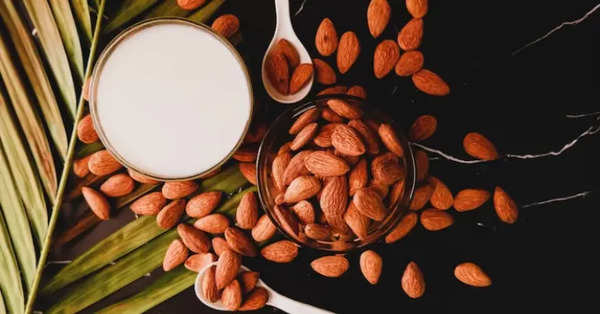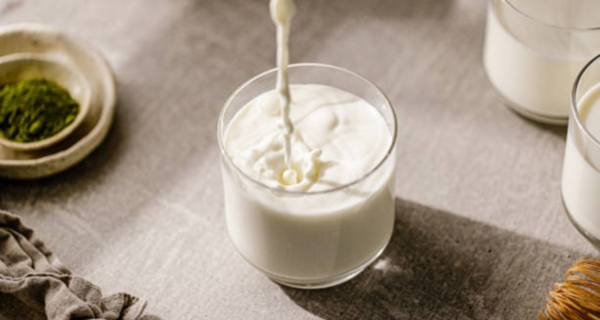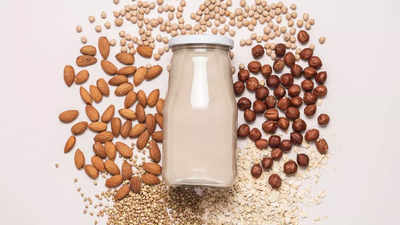
Since ages, we have been told about the numerous benefits of drinking milk regularly, but over the years there has been a shift in the trend of milk consumption, and many people are moving towards plant-based milk for its umpteen health benefits. While, for some people, switching to plant-based milk is a fad, others find it a better alternative to regular dairy-based milk. Here’s a lowdown on plant-based milk and are these milk alternatives really healthy?

From keeping us warm to satiating our hunger, dry fruits are a great source of healthy fats and offer a ton of health benefits that make them an integral part of our diet.
The trend and market
Over the years, the love and demand for lactose-free milk alternatives have gained immense popularity around the world. From soy to oat to almond, rice, and cashews, the emerging trend of plant-based milk has already made a significant impact on the market statistics. According to a recent report by an industry research journal, IndustryARC, on plant-based milk forecasts, it was mentioned that
Plant-Based Dairy Products Market size is estimated to reach $28 billion by 2030, growing at a CAGR of 8.7% during the forecast period 2023-2030.’ Apart from that, it was also emphasized that the market growth was driven by shifting consumer preferences towards healthier and more sustainable dietary choices such as soy, almond, coconut, oats, and rice that mimic the taste and texture of traditional dairy products such as milk, cheese, yogurt, and butter.
The change in preference
One of the major reasons that has driven the growth of plant-based milk is the difference in the composition, which makes it a good option for people suffering from lactose intolerance and other digestive issues, as plant-based milk turns out to be a healthier alternative to traditional dairy milk. Here’s all you need to know about the plant-based milk alternatives.
Why plant-based milk?
The shift from dairy to plant-based alternatives is largely driven by a variety of factors, including:
Lactose intolerance
One of the major reasons why there’s a surge in the demand for plant-based milk is the absence of lactose, which makes it a healthy and safe option for people struggling with IBS, gut health issues, and metabolic syndromes. In fact, many people have difficulty digesting lactose, which is a sugar found in dairy products, which often leads to digestive discomfort, bloating, gas, and diarrhea. According to a study published in the digital journal of News Medical Life Sciences, a study on ‘How do animal- and plant-based milks affect gut health? Mentioned that: ‘While plant-based milk can positively impact gut health, promoting the growth of beneficial bacteria, there are some concerns. Soy milk, for instance, has been found to increase beneficial bacteria while reducing harmful ones like Proteobacteria, which helps in improving digestive health.
Vegan choices
As more people adopt vegan or plant-based diets for ethical reasons, plant-based milk has gained popularity as a cruelty-free substitute for cow’s milk.
Environmental concerns
Plant-based milk is considered more sustainable than dairy milk. Producing plant-based milk typically requires fewer resources, such as land, water, and feed, than producing dairy, which has a larger environmental footprint.
Health considerations
People are increasingly seeking healthier food options, and many perceive plant-based milk to be a better choice than cow’s milk due to concerns about saturated fat, hormones, and antibiotics in dairy products.

Nutritional aspects of plant-based milk vs. dairy milk
The nutritional composition of plant-based milk varies depending on the source of origin. Well, here’s a comparison of some of the most popular types of plant-based milk and traditional cow’s milk.
Almond Milk
Almond milk is low in calories as compared to cow’s milk, which has around 30-60 calories per cup.However, it contains very little protein, 1g per cup, which is much lower than dairy milk that has around
8g per cup. Apart from that, almond milk is rich in vitamin E, an antioxidant, which is generally low in other essential nutrients unless fortified with calcium and vitamin D.
Soy Milk
Similar to dairy milk, soy milk has about 80-100 calories per cup. However, soy milk contains a good amount of protein, 6-8g per cup, making it the closest match to cow’s milk in terms of protein content. It’s typically fortified with calcium and vitamins D and B12 to match the nutritional value of cow’s milk.
Oat Milk
Oat milk is higher in calories compared to almond milk, averaging around 120 calories per cup. However, it contains about 2-4g of protein per cup.Oat milk is a good source of fiber and may be fortified with vitamins and minerals, including calcium and vitamin D. Its creamy texture makes it popular for coffee and lattes.
Rice Milk
Rice milk tends to be higher in carbohydrates, offering around 120 calories per cup. However, it contains very little protein, which is less than 1g per cup. Well, rice milk is often fortified with calcium and other vitamins but can have a high glycemic index, making it less suitable for those with blood sugar concerns.
Cashew Milk
Cashew milk contains around 25-50 calories per cup. However, the protein content of this milk is around 1g per cup.In fact, cashew milk is low in carbohydrates and may be fortified with vitamins and minerals, though it doesn’t naturally offer much in terms of nutrients.

Coconut Milk
Full-fat coconut milk is high in calories, around 450 per cup, but the low-fat version has around 45 calories. However, coconut milk is low in protein and has around 1g per cup.Coconut milk contains medium-chain triglycerides (MCTs), which may have benefits for metabolism and weight loss, but it’s low in other essential nutrients.
Dairy Milk
Dairy-based milk contains about 150 calories per cup, while skim milk has fewer calories, around 90. Dairy milk is high in protein and has around 8g per cup.It is a good source of calcium, vitamin D, and B12, and it also contains riboflavin and phosphorus.

Health benefits of plant-based milk
While the nutritional profile of plant-based milk varies, there are certain health benefits associated with most options:
Lactose-free and easier to digest
For people who are lactose intolerant or have dairy sensitivities, plant-based milk is an excellent alternative. Soy, almond, oat, and other plant-based milks are naturally lactose-free, making them easier to digest without causing discomfort.
Low in saturated fat
Many plant-based milks are lower in saturated fat compared to whole dairy milk, which can be beneficial for heart health. Saturated fat has been linked to increased cholesterol levels and a higher risk of cardiovascular diseases.
Weight Management
Another important factor behind the immense demand for these plant-based milks is because of their low calorie and high protein content, which makes it a healthier choice for weight watchers.
Read on: Plant-based beverages vs cow milk: Are they equally nutrition
Rich in antioxidants
Plant-based milks, especially almond and soy milk, are rich in antioxidants like Vitamin E, which helps protect the body from oxidative stress and supports skin health. Antioxidants play an essential role in preventing chronic diseases and aging.
Bone Health
Many plant-based milks are fortified with calcium and vitamin D to match or even exceed the levels found in cow’s milk. This is particularly important for maintaining bone health, especially for individuals who don’t consume dairy products.
Potential downsides
While a lot has been said about these plant-based milks and their benefits, there are certain drawbacks that still bring us to the question of whether it is better than regular milk. Read on to find out…
Nutrient deficiencies
Not all plant-based milks are naturally rich in essential nutrients like calcium, Vitamin D, and protein. Many brands fortify their products, but if the product you choose is not fortified, you might miss out on these vital nutrients. For example, almond milk is naturally low in protein, and rice milk is low in nutrients unless fortified.
Watch: 5 Best vegan milk options
High sugar content
Some plant-based milks, especially sweetened versions, can contain added sugars. This can lead to weight gain and spikes in blood sugar levels. If you’re opting for plant-based milk, it’s important to choose unsweetened varieties to avoid unnecessary sugar consumption.
Allergic reactions
Certain plant-based milks, such as soy or almond milk, may cause allergic reactions in individuals with nut or soy allergies. It’s important to read labels carefully and choose an alternative if you have known food allergies.
Conclusion
Plant-based milk can be a healthy alternative to dairy milk, especially for those with lactose intolerance or specific dietary or calorie preferences. However, plant-based milks can make for a healthy choice and help in improving heart health, boosting digestion, and better bone health, especially when fortified with key nutrients. However, it’s also important to be aware of the nutritional content of different plant-based milks, particularly their additives or sugar content. Also, replacing dairy-based milk can reduce the calcium intake in the body; thus, it is best to opt for unsweetened and fortified plant-based milk.
What is your take on this?






